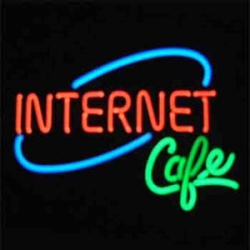
Internet Sweepstakes Cafes Are Found in Every US State
A new type of illegal gambling has begun to appear in convenience stores and strip malls across the United States, according to a recent report in USA Today. This gaming has the look of a standard Internet cafe, but provides a portal to illegal online games for real money.
For the uninitiated, an Internet cafe is a place people can take their laptops notebook PCs, tablet computers, and smartphones to get online. These shops use Wi-Fi routers to offer free online access for those who want to get out of the house or apartment, yet still enjoy surfing on the Internet. Such cafes are popular with students and young adults, who might not have access to a personal online connection, otherwise. These net users go to the Internet cafe, buy a coffee, and get online.
Appear to Be Cybercafes
In the case of the illegal Internet cafe, computer screens are set up which connect a person to an online game for real money. The games they play look like slot machines or video poker machines, but the games themselves take the form of “sweepstakes”.
Players buy time on the computer. Less often, they pay for long distance phone time. In either case, these payments acts as entry fees into a sweepstakes. To see whether they win, they must log on to the Internet and play the game.
Sweepstakes or Illegal Games of Chance?
According to the owners of these cybercafes, the games played are legal–no different than the scratch-off sweepstakes you would play at McDonald’s. When a consumer rolls up to the drive-thru window at McDonald’s, they pay for a burger or McNuggets and receive a sweepstakes card, which plays out much like the games in the cybercafe. Authorities and corporate executives see these games as legitimate marketing techniques–not a front for illegal games.
To state and local authorities, these online games in the strip mall cafes are outlawed forms of gambling. The problem from the perspective of local and state law enforcement agencies, these cybercafes are hard to police. They look like any other net cafe in a strip mall, so it’s a matter of chance that the authorities ever find out about them.
None of this might matter, but agencies believe these illegal Internet slots cafes collect $10 billion a year in revenues. This is a significant revenue source for what they consider criminals, and the business model could explode into a real social concern.
States Are Banning Games
The legal gray area is getting smaller. Already, the states of Florida, Mississippi, and Ohio have outlawed Internet sweepstakes cafes. California and Connecticut are also considering laws.
Many other states could join in banning these games. The Attorney General of Ohio, Mike DeWine, recently spoke to a nationwide conference of state officials about the problem. He says the sheer amount of money being wagered is what makes this practice so objectionable.
Governments Want Their Share
From the perspective of state governments, the online sweepstakes cybercafes are unregulated, so the state receives no revenue from them. If you gamble at a licensed land-based casino or on the lottery, then the state receives its share of the revenues. Even the newly-regulated online casinos in Delaware, Nevada, and New Jersey offer state’s a cut of the action.
The same cannot be said with these illegal cafes. With most U.S. states desperate to find more cash, they are going to take a dim viewer of a business which finds a way to avoid paying taxes.
Ohio Gaming Enforcement
Ohio may be the starkest example. The state only legalized land-based casino gambling in 2012, authorizing casinos in Cleveland, Columbus, and Toledo. Gambling is new to the region and people are interested in the hobby as a form of entertainment and thrills. When the gaming parlors started showing up in local strip malls, people flocked there. Ohio’s law enforcement officials took steps to end such activity, but their efforts have met only with partial success.
Legislation helped shut down most of the 800 such illegal slots shops in Ohio, but these operators opened up somewhere else. Instead of calling themselves sweepstakes cafes in the White Pages, they call themselves “skill game shops”. The ability to evade the law means tens of millions, perhaps hundreds of millions, of dollars are not collected by state and local authorities, if these gamblers went to land-based casinos, instead.
Thus, a cat-and-mouse game continues between the cafe owners and Ohio’s authorities. The same is playing out on a wider scale across America, since thousands of these cafes have opened up. With the interest in online gambling increasing in the USA, this particular form of illegal could mushroom into a nationwide problem.
